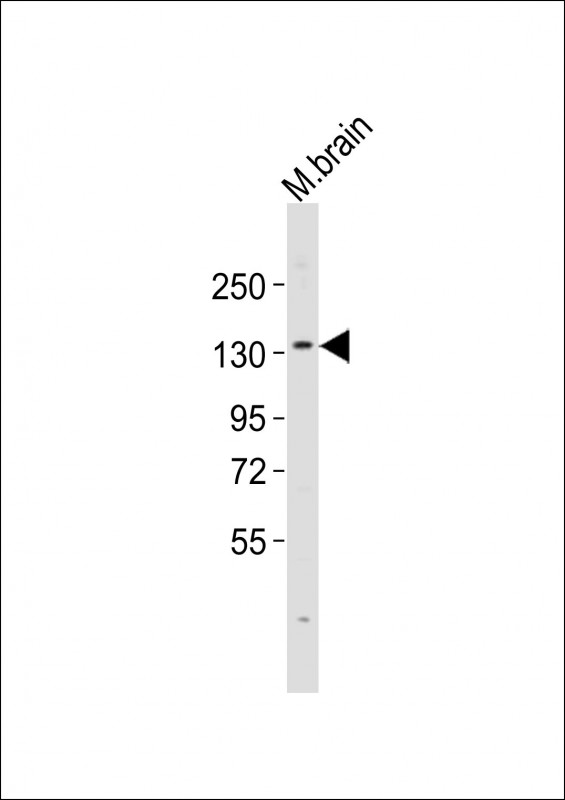
| WB | 1/1000 | Human,Mouse,Rat |
| IF | 咨询技术 | Human,Mouse,Rat |
| IHC | 咨询技术 | Human,Mouse,Rat |
| ICC | 技术咨询 | Human,Mouse,Rat |
| FCM | 咨询技术 | Human,Mouse,Rat |
| Elisa | 咨询技术 | Human,Mouse,Rat |
| Aliases | Histone-lysine N-methyltransferase EHMT2, 211-, Euchromatic histone-lysine N-methyltransferase 2, HLA-B-associated transcript 8, Histone H3-K9 methyltransferase 3, H3-K9-HMTase 3, Protein G9a, Ehmt2, Bat8, G9a, Ng36 |
| Entrez GeneID | 110147 |
| WB Predicted band size | 138.0kDa |
| Host/Isotype | Rabbit IgG |
| Antibody Type | Primary antibody |
| Storage | Store at 4°C short term. Aliquot and store at -20°C long term. Avoid freeze/thaw cycles. |
| Species Reactivity | Human, Mouse, Rat |
| Immunogen | This Mouse Ehmt2 antibody is generated from a rabbit immunized with a KLH conjugated synthetic peptide between 589-623 amino acids from the Central region of Mouse Ehmt2. |
+ +
以下是3条关于 **Ehmt2(G9a)抗体** 的参考文献,按研究领域和内容简要概括:
---
1. **文献名称**: *Histone methyltransferases G9a and GLP form heteromeric complexes and are both crucial for methylation of euchromatin at H3-K9*
**作者**: Tachibana M, et al.
**摘要**: 该研究首次克隆了Ehmt2(G9a)基因,并开发了特异性抗体,证实G9a与GLP形成复合物,负责常染色质组蛋白H3K9的二甲基化(H3K9me2),调控基因沉默和发育过程。抗体用于检测G9a在细胞核内的定位及其酶活性。
---
2. **文献名称**: *G9a/GLP-dependent H3K9me2 patterning alters chromatin structure at CpG islands in mouse embryonic stem cells*
**作者**: Shinkai Y, Tachibana M.
**摘要**: 作者利用Ehmt2抗体结合ChIP-seq技术,揭示了G9a/GLP介导的H3K9me2修饰在胚胎干细胞中对CpG岛染色质结构的调控作用,及其对基因表达和细胞分化的影响。
---
3. **文献名称**: *Targeted disruption of the Ehmt2 gene induces cell cycle arrest and apoptosis in central nervous system*
**作者**: Bian C, et al.
**摘要**: 研究通过Ehmt2抗体验证基因敲除小鼠模型中G9a蛋白的缺失,发现Ehmt2缺失导致神经细胞周期停滞和凋亡,表明其在神经发育中通过表观遗传调控发挥关键作用。
---
**备注**:
- Ehmt2(G9a)抗体常用于研究组蛋白甲基化修饰机制、基因沉默及疾病(如癌症、神经退行性疾病)中的表观遗传调控。
- 以上文献均发表于高影响力期刊(如 *Nature*, *Genes & Development*),方法学中明确提及抗体的应用场景(如Western blot、免疫荧光、ChIP)。
The Ehmt2 antibody targets the Euchromatic Histone Lysine Methyltransferase 2 (EHMT2), also known as G9a, a key enzyme in epigenetic regulation. EHMT2 is a histone methyltransferase that primarily catalyzes the dimethylation of histone H3 at lysine 9 (H3K9me2), a modification associated with transcriptional repression and heterochromatin formation. It plays critical roles in gene silencing, X-chromosome inactivation, and genomic imprinting. Dysregulation of EHMT2 has been linked to cancers, neurodevelopmental disorders (e.g., Kleefstra syndrome), and metabolic diseases, making it a focus of biomedical research.
The Ehmt2 antibody is a tool used to detect and study the expression, localization, and function of the EHMT2 protein in various experimental settings, including Western blotting, immunohistochemistry (IHC), immunofluorescence (IF), and chromatin immunoprecipitation (ChIP). Developed in hosts such as rabbits or mice, these antibodies are validated for specificity and affinity to ensure reliable results. Researchers utilize Ehmt2 antibodies to explore its role in epigenetic mechanisms, cellular differentiation, disease pathways, and potential therapeutic targeting. Commercial antibodies often include options for monoclonal or polyclonal formats, with applications spanning basic research and drug development.
×